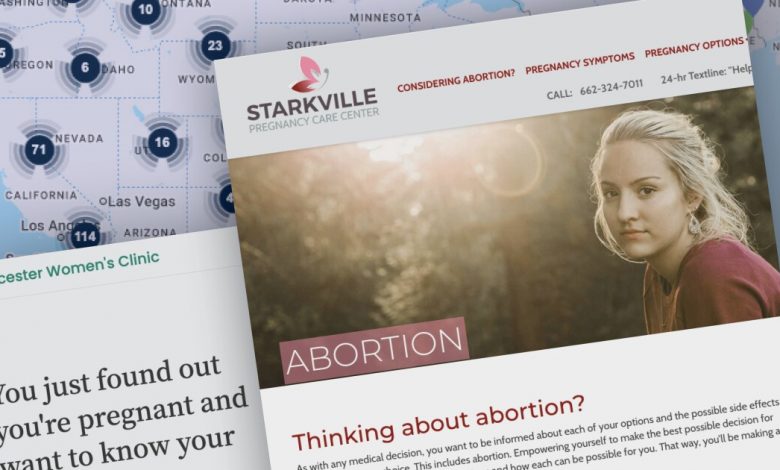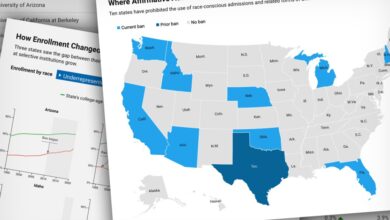Crisis-Pregnancy Centers Have Been Orbiting Campuses for Years. What Are They?

When Hana got pregnant as a college freshman this year, she worried about her health. She studies public health and knew ectopic pregnancy was a risk. She wanted to see a doctor quickly to make sure she didn’t have one. And she wanted an abortion.
Her provider couldn’t see her right away. She called the friend who had gotten her pregnant; he Googled “abortion services near me” and found a website for Worcester Women’s Clinic, in Massachusetts. The clinic could see Hana, who asked that only her first name be used to protect her privacy, in two days.
It wasn’t until Hana got there that she started noticing red flags. One was that the actual name of the clinic differed from what was on the website. She realized later that it was a crisis-pregnancy center.
Since the Supreme Court last month overturned Roe v. Wade, the legal precedent that enshrined the right to an abortion in the Constitution, such centers have gotten increased attention. The facilities rarely have affiliations with colleges but have, in some cases, been orbiting campuses for years. Students like Hana, who seek reproductive-health care, may visit crisis-pregnancy centers, sometimes without realizing that they do not offer or refer for abortions. Instead, their intent is to dissuade women from having them.
Inside the center, Hana found what looked like a doctor’s office. She filled out some forms, and a woman asked her questions, like what did she want to do? What did the father want? She told Hana that if he was pressuring her to get an abortion, she didn’t have to go through with it. The woman also told her that abortions can cause excessive bleeding, which could kill her. (Planned Parenthood calls abortion “one of the safest medical procedures out there,” and in 2018 the National Academies of Sciences, Engineering, and Medicine also concluded the procedure was very safe in the United States.)
“She kept referring to my pregnancy as a baby,” Hana said. “Having found out that I was pregnant early on, I pushed back and said it’s an embryo. She said, ‘Zygote, embryo, fetus, whatever you want to call it, it’s still your baby.’”
A Telltale Map
Crisis-pregnancy centers are nonprofit organizations that attempt to keep women from having abortions. Most are affiliated with national evangelical Christian organizations that are anti-abortion and anti-contraception, according to scholars who study them. Some offer nondiagnostic ultrasound scans, pregnancy testing, parenting classes, and “post-abortion support.” Many give away supplies for newborns and new mothers who attend their classes. In some states they receive government funding.
Patients seeking information and options about their pregnancies have reported that they walked into crisis-pregnancy centers hoping to learn about abortion. Instead they have been encouraged to consider continuing their pregnancies and told about the health risks of abortions.
Some centers target college students. Andrea Swartzendruber, an epidemiologist at the University of Georgia, analyzed the centers’ locations in Georgia and found that they were disproportionately clustered around the state’s colleges and high schools when compared with other health clinics. Swartzendruber and her colleague Danielle Lambert have mapped the locations of more than 2,500 crisis-pregnancy centers across the United States.
That map has drawn the ire of the right, especially since the fall of Roe. In June, Fox News published an article headlined “Far-Left Radicals Find Targets Using UGA Professors’ Map of Pro-Life Clinic Addresses.” The article noted that leftist groups had tweeted links to the map, and reported that a handful of crisis-pregnancy centers were vandalized after Roe was overturned by the Supreme Court’s decision in Dobbs v. Jackson Women’s Health Organization.
The University of Georgia’s College of Public Health posted a statement on its website the day the article was published. It said that the map’s purpose “is to promote academic research and increase public awareness about crisis-pregnancy centers” and that the information published in the map was publicly available. “The authors of the site condemn all threats or acts of vandalism or violence against crisis-pregnancy centers,” the statement said.
The Fox News article got the attention of Republican lawmakers. On July 7 two members of the U.S. House of Representatives from Georgia wrote a letter to the university’s president, Jere W. Morehead, expressing “deep concern” about the University of Georgia professors. The congressmen named the professors and demanded that the university stop funding their project.
Swartzendruber declined to comment, and Lambert did not respond to an interview request. A university spokesman referred The Chronicle to the June statement on the College of Public Health’s website and noted that “the map is not housed on websites belonging to the college or the University of Georgia.”
Strategic Locations
Scholars who study crisis-pregnancy centers, sometimes called CPCs, say they are often located near colleges and high schools in other parts of the country besides Georgia. They also tend to be located near clinics that provide abortion services.
“They place themselves strategically,” said Carrie N. Baker, a professor of the study of women and gender at Smith College, “so that students can think that is an abortion clinic or just someone who’s going to give you fair information.”
Baker said she worried that crisis-pregnancy centers, which are often not covered by federal medical-privacy laws but do collect medical information from the people who visit them, could work hand in hand with law-enforcement officials in states that may try to prosecute women who seek abortions or those who help them.
“Colleges need to offer abortion pills in their health centers so students don’t end up at CPCs,” Baker said. If they cannot offer abortion by medication, “they need to provide comprehensive information about where to find an abortion nearby.”
They place themselves strategically, so that students can think that is an abortion clinic or just someone who’s going to give you fair information.
Many doctors do not advertise that they offer abortions because they don’t want to draw anti-abortion protesters to their doors, she said. When students go to their college or university health centers, they can get referred to local services, but unless the health centers advertise that that’s an option and provide the transportation, students might not take advantage of it.
At Mississippi State University, Kimberly Kelly, an associate professor of sociology, noticed signs around campus, including at the health center’s entrance, advertising a local crisis-pregnancy center.
While conducting research for her dissertation on crisis-pregnancy centers from 2006 to 2009, Kelly visited several of them and saw differences in how they were designed based on whom they were trying to reach. Most centers were set up to look like doctors’ offices, with waiting areas and private rooms. But one, near a college, was in a house on the edge of campus and looked like a “cool place where you would want to hang with friends.”
“Their two main goals are to persuade women not to have abortions,” Kelly said, “and to convert clients to evangelical Christianity.”
“They’re not a very appropriate place to send students,” she added, “unless students are aware of all those things.”
Some crisis-pregnancy centers seem to market themselves to college students online. Those centers, like the one near Mississippi State, have tabs on their websites labeled “students” that lead to pages listing local colleges and universities. For each college or school listed on that site, including Mississippi State and Mississippi University for Women, there’s a link to a Google map that shows viewers how to get from their campus to the center.
That center’s staff members directed questions from The Chronicle to their national affiliate, the National Institute of Family and Life Advocates, which “exists to protect life-affirming pregnancy centers that empower abortion-vulnerable women and families to choose life for their unborn children,” according to its website. The national organization did not respond to emailed questions in time for publication.
A Frantic Message
Hana soon figured out that she was in a crisis-pregnancy center. After answering the first woman’s questions, another woman, whom the first woman said was a former nurse, gave her an ultrasound. Hana said the former nurse told her she was much further along than she knew she was. The former nurse asked Hana if she wanted to “see her baby,” and when Hana replied that she did not, the woman said, “What kind of mother doesn’t want to look at pictures of her own baby?” That’s when Hana left.
Hana told the BBC her story, which reported that the Human Coalition, an anti-abortion group based in Texas that was the subject of a recent New York Times exposé, provided marketing for the center she had visited. A phone call by The Chronicle to the center led to a call service that said the center’s staff would not be available to talk on Friday. The person who answered a call to the number listed for the Worcester Women’s Clinic referred The Chronicle to a public-relations firm that did not respond to an email in time for publication.
In this incredibly vulnerable time, there’s someone watching me, trying to tell me what I’m doing is wrong and what I’m doing will kill me.
Hana later called a medical clinic and left a frantic message describing her experience. A nurse called her back and told her that though that clinic did not have openings, she had made an appointment for Hana at one that did.
Hana is still worried that the crisis-pregnancy center has sensitive information about her, including her cellphone number.
“In this incredibly vulnerable time, there’s someone watching me, trying to tell me what I’m doing is wrong and what I’m doing will kill me,” she said. She wishes her college had made more information clearly available about what her options were. (She declined to name the college to protect her identity.) Hana said the best she could find was a student group that offered peer support.
Now she and members of that group are putting together a handbook of information on how to get an abortion. She hopes the next student who comes to the group looking for help will know where to go.
Source link






